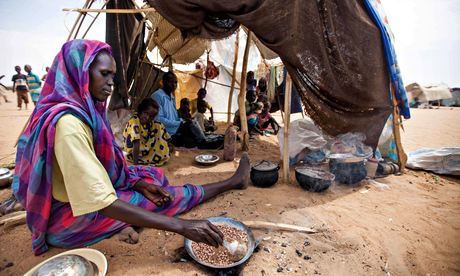Economic Empowerment
Source: The Guardian
While attention in the sector has recently been focused on the IPCC's latest report on climate change, in Sudan women have been quietly making breakthroughs by issuing the country's first carbon credits. In a country blighted by conflict and drought, the Women's Development Association Network (WDAN) representing over 50,000 women in Sudan, is driving economic growth and reversing deforestation.
The town of El Fasher, the capital of the North Darfur region, is an area considered high risk by international markets because of its history of civil war, conflict and reliance on humanitarian aid. It is here that theDarfur Low Smoke Project, financed entirely by private sector money, was launched in 2007 by the WDAN, the international NGO Practical Action and the UK-based company Carbon Clear.
North Darfur is typical of areas in the region in that most of the poorest groups of women depend upon wood and charcoal for cooking. The result has been widespread deforestation and increasing desertification, made worse by extreme climate variability. To help reverse this process, women are being sold modern, energy-efficient, clean-burning liquid petroleum gas (LPG) cookstoves.
Setting up the project has been challenging. A year after it started several audit firms were contacted to check documentation and verify activity on the ground, an essential prerequisite for issuing carbon credits. All of the companies contacted refused to visit North Darfur, stating it was too unstable. Eventually an auditor was found but the site visits only took place in 2010, losing two year's credits. This financial uncertainty meant the project was nearly wound up in 2009.
Despite these initial setbacks, the project is now making headway. Out of a target of 10,000 cookstoves, 6,000 have been delivered, saving over 36,000 tonnes of carbon dioxide emissions. Over half of the stoves have been registered by the Gold Standard Foundation in Switzerland, meaning that their emissions savings are eligible to be sold as premium carbon credits.
One of the women who has been using the stoves is Randa Faudul Ali, who lives in the village of Kafut. "Cooking with wood meant that the whole house was full of smoke. It's a house made of hay and inside it is completely black. I have serious eye problems as a result of the smoke – I was going blind because of the smoke. I think the LPG stove has saved my sight."
Ali adds: "I belong to the Women's Development Association in my village and other women come to my house to see the LPG stove and have learned about this new, safe way of cooking. I am helping to distribute 19 stoves to families across my village and 61 to other communities nearby."
In Sudan, charcoal costs a household around £20 a month, while LPG costs roughly £7 a month. But, the initial cost of the stove and gas canister place them beyond the reach of most families. To overcome this obstacle, Carbon Clear introduced a micro-loan scheme, which is operated by the WDAN. After six years, repayment rates are above 90% – very high for an area where nearly half of the people live below the poverty line.
As a result, local women's groups have been trained in how to manage money – enabling them to issue loans and collect repayments. They have also set themselves up as the main dealers for the Nile Petroleum Company in North Darfur and have established a series of community forests. To date over 43 community forests have been planted, each between 10-40 acres in size, to help replace North Darfur's scant tree cover.
Over the next decade it is hoped that the project's stoves will save over 300,000 tonnes of carbon and hundreds more community forests will be planted. The first credits from the Darfur project were recently sold to an insurance firm based in the UK.
"The Darfur Low Smoke Stoves Project demonstrates how businesses can successfully reduce emissions and make a positive contribution to communities," says the CEO of Carbon Clear, Mark Chadwick.
The project has brought carbon finance to some of the poorest communities in the world and at the same time shown the potential of women to lead the way in tackling climate change.
"It is essential that carbon finance reaches poorer countries, regions and communities – and it must both deliver climate and development outcomes," says Adrian Rimmer, CEO of Gold Standard. "Our goal is to drive finance into thousands more projects that will help to mitigate climate change and bring development benefits to millions of people in Sudan and around the world."

Many people in Darfur, especially those who are internally displaced, rely on wood and charcoal for cooking. Photograph: Albert Gonzalez Farran/AFP/Getty Images
